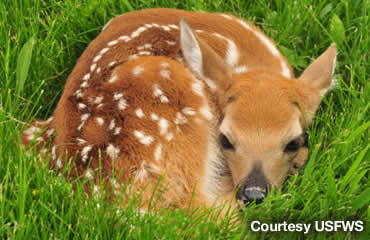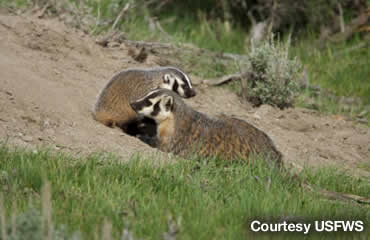Spring means it is time for wildlife to bear young. Often, during this time of year, people come in contact with seemingly orphaned young wildlife and want to help – but it is best to leave them where you find them, according to the Georgia Department of Natural Resources’ Wildlife Resources Division.
"When you take wildlife into your home, you often take away that animal’s ability to survive in the wild, where they belong,” explains John Bowers, Wildlife Resources Division chief of game management. “In most instances, there is an adult animal a short distance away – even though you may not be able to see them. Adult animals, such as deer, spend most of the day away from their young to reduce the risk of a predator finding the young animal.”
The best thing people can do when they see a young animal, or in fact any wildlife, is to leave it alone exactly as they found it. Situations become much more complex, and sometimes pose a danger to the wildlife or people, when an animal is moved or taken into a home.
 What if the animal is injured?
What if the animal is injured?
People not licensed and trained in wildlife rehabilitation should not attempt to care for wildlife. In fact, many states have laws that prohibit the possession of most wildlife without a permit. If you encounter a seriously injured animal or an animal that clearly has been orphaned, please contact a local, licensed wildlife rehabilitator.
Why wildlife does not belong in the home
Handling any wildlife or bringing them into the home poses health risks for both people and domestic pets.
Despite the fact that they may look healthy, wildlife can transmit life-threatening diseases such as rabies and can carry parasites such as roundworms, lice, fleas and ticks. Certain ticks transmit diseases to humans, such as Rocky Mountain Spotted Fever and Southern Tick-Associated Rash Illness.
 It’s easy to protect yourself and your family.
It’s easy to protect yourself and your family.
Contact the local county health department and/or Wildlife Resources Division office of your state game department or commission if you encounter an animal such as a bat, fox, skunk, raccoon, coyote or bobcat that appears to show no fear of humans or dogs, or an animal that seems to behave in a sick or abnormal manner such as weaving or excessive drooling. The animal may be afflicted with rabies, distemper or another disease.
Do not attempt to feed or handle found young wild animals. Pets, livestock and humans should be kept away from the area where the animal was observed.
The two most important steps anyone can take to protect yourself and your pets from rabies is 1) get pets vaccinated and 2) avoid physical contact with wildlife.
As another precautionary step, adults should instruct children to never bring wildlife home.
Videos about this topic can be found by clicking here.
Georgia residents can find a list of licensed rehabilitators by clicking here.
Select “Special Permits” from the right hand side of the home page ad scroll down to “Wildlife Rehabilitation”.
For more information, Georgia residents can call a local Wildlife Resources Division office at (770) 918-6416, or find them online.
—From the Georgia Department of Natural Resources